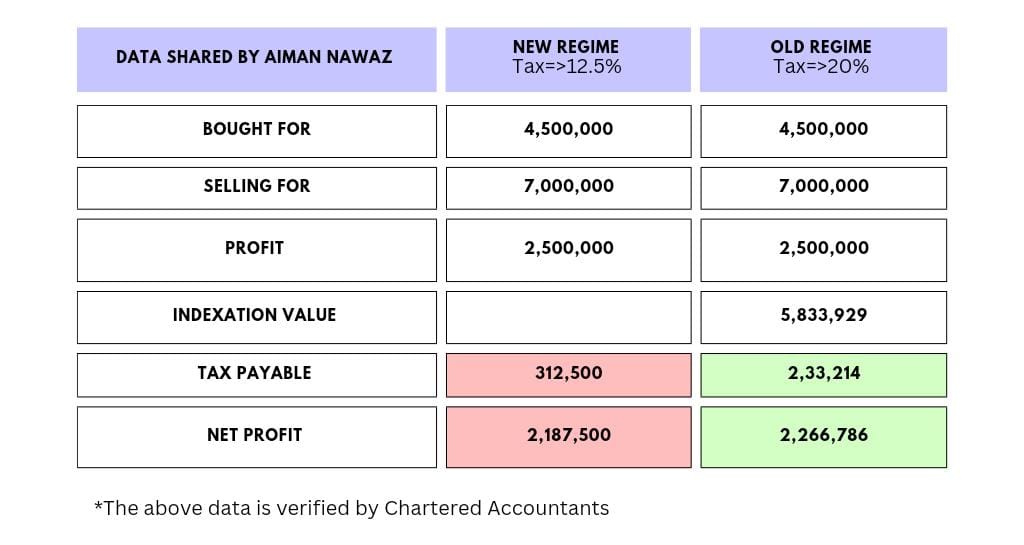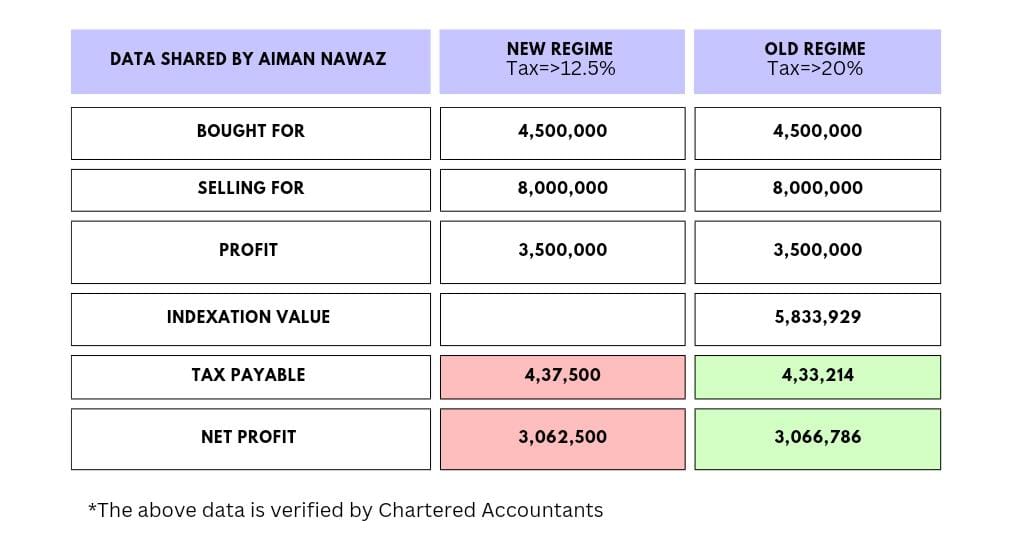.jpg?downsize=773:435)
In 2018, Aiman Nawaz, a 28-year-old analyst with an investment bank, bought a 1 BHK flat at a Prestige building in Bengaluru's Nagasandra. Nawaz bought the property for Rs 45 lakh for investment purposes and now plans to sell it at an appreciated price of Rs 70 lakh. But, in order to sell his property, he will have to pay an additional Rs 80,000 as tax on long-term capital gains.
Why? He blames the government's new regime on long-term capital gains and plans to scrap the indexation benefit available on real estate.
Now, Nawaz will have to pay Rs 3.12 lakh as long-term capital gains tax on selling the property, versus Rs 2.33 lakh under the old regime. A higher tax can result in shrunken profits for Nawaz, adding to his disappointment with the new LTCG tax norms. The following chart explains how his profit will be affected.

Finance Minister Nirmala Sitharaman, while presenting the 2024 Union Budget last week, announced that the tax on long-term capital gains had been slashed to 12.5% from 20%. However, the indexation benefit on real estate transactions for properties bought in and after 2001 was scrapped.
This implies that the seller of a property would be liable to pay tax on the entire gain made without adjusting for inflation. The announcement has sparked confusion and concern around profits made on property sales and real estate transactions.
Indexation Scrap A 'Mixed Bag'
“We are exploring it in a lot of detail, but as of now, it's a mixed bag. Wherever the returns are in excess of the 10-12% range, the new rules without indexation are not detrimental to the seller," said Apurva Salarpuria, director at Salarpuria Group. “But in a lot of cases, where people have older land, it may not give the same benefits without indexation."
For many property owners, particularly those who have held their assets for a long period, the lack of indexation could result in a higher tax outgo than under the previous regime, according to Presscon, a global real estate developer. This change might affect long-term investors and could potentially dampen enthusiasm for long-term property investments, it said in a note.
Apart from builders, property consultants and companies in allied sectors also carry a similar view. “...The removal of benefits is expected to impact long-term investments in the real estate sector, subsequently discouraging long-term holding of properties,” said Abhishek Rustagi, partner at Design By Meta, a multi-disciplinary firm active in architecture, interior design, and urban planning.
The new regime would “severely” impact the real estate sector in cities like Hyderabad and Bengaluru, where investing in properties proves a fruitful prospect only in the long run, Rustagi said. However, the impact of this new regime is likely to be negative in cities with holding periods of less than five years and where property price appreciation is moderate.
The indexation benefit could have helped in cases where properties have not appreciated much, said Prashant Thakur, head of research ANAROCK Property Consultants.
So, scrapping the indexation benefit can substantially increase the payable tax if the prices of properties have not appreciated enough. According to Nawaz, he would have paid only Rs 5,000 extra as tax on long-term capital gains if the price of his property had appreciated to at least Rs 80 lakh. The chart below explains how.

Benefit In Long-Term
While industry participants highlighted current concerns around the scrapping of indexation, they also held a consensus on the positives foreseen in the longer term. Scrapping indexation will simplify calculations and processes during real estate transactions and will not impact sellers much, where price appreciation is significantly higher, according to several builders and property holders.
“If you look at the house prices, they have gone up by at least 30–40%. So, where property prices have gone up in two-digits and inflation has been in single-digits, in that case, 12.5% without indexation would be slightly better off," said Thakur.
Properties under construction have grown by nearly seven times in value on average, while the overall real estate sector has grown nearly four times since 2009, according to ANAROCK data. Further, as per the data compiled from individual builders by NDTV Profit, the mid- and upper-end price of the property sector starts at Rs 60 lakh in Bengaluru and Hyderabad, while the luxury space begins somewhere between Rs 1-2 crore.
Meanwhile, in cities such as Ahmedabad and Kochi, property prices range from Rs 40 lakh and above for the mid- and upper-mid segment and over Rs 60 lakh for luxury spaces. Buying in the luxury segment has seen an uptick, the mid-segment has been catching up, while the affordable segment has seen a decline in the medium term, according to ANAROCK.
“From a long-term perspective, it is a healthy move that simplifies the whole process, where the end-user or the seller is very clearly able to calculate on his own without seeking help from experts and accountants in terms of their own situation on capital gains," said Salarpuria.
In the long run, this is expected to lead to simplification of income tax and reduced litigation, said Jayant B. Manmadkar, chief financial officer, Brigade Group.
“Now, capital gains tax is straightforward: calculate the difference between the sales price and the cost price and apply a 12.5% tax," explained Concorde Chairman Nesara BS. The new regime will benefit recent property buyers, as they previously faced an effective tax rate of around 60–70% due to indexation benefits, he said.
A lower tax rate could incentivise more transactions and boost liquidity in the real estate market, as per industry leaders.
Other amendments proposed in the new regime include cutting the minimum holding period for eligibility for long-term capital gains to two years from three years earlier. Further, the exemption on capital gains tax has increased to Rs 1.25 lakh from Rs 1 lakh.
Henceforth, the real impact will ultimately vary based on individual circumstances, including the rate of inflation and the holding period of the property. “It is advisable for property owners to closely analyse their specific situations and possibly seek professional tax advice to navigate this new landscape effectively," said Presscon.
For now, property sellers remain confused on how to cross over the risks associated with the new regime. “What has happened on an immediate basis is that a lot of transactions that were underway, especially with respect to land, have hit a little bit of a pause, quickly trying to examine what the impact of this is. How do they plan for capital gains?” Salarpuria said.
Salarpuria also expects a bundle of such transient issues while property holders adjust to the new tax regime. However, these issues will be short-lived, according to him. “With regards to long-term capital gains tax, this is the new normal but will, however, take time to settle," said Brigade Group's Manmadkar.
“This most definitely impacts the middle-class, end-consumer, with a significantly higher tax impact. I think one should have both options open for tax calculation," Nawaz said.
Essential Business Intelligence, Continuous LIVE TV, Sharp Market Insights, Practical Personal Finance Advice and Latest Stories — On NDTV Profit.























